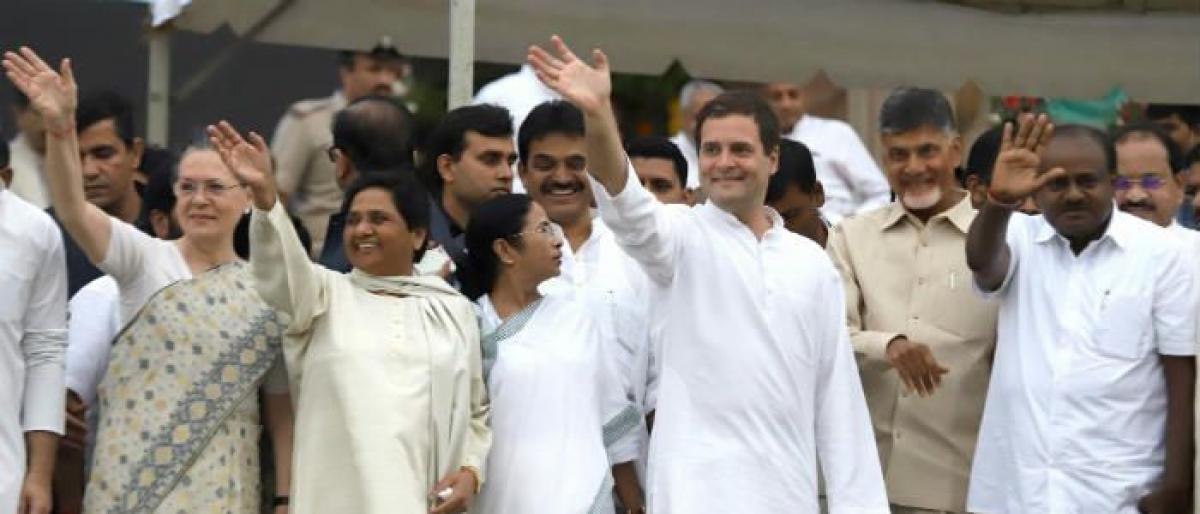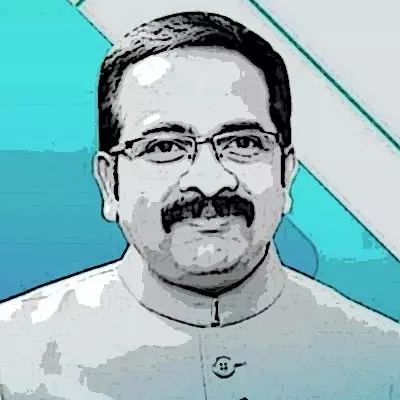Live
- Delhi Police busts gang involved in cable theft on Delhi Metro Blue Line
- MP's Gita recitation programme finds place in Guinness World Records
- Pawan Kalyan Shines Globally as 2nd Most Googled Actor of 2024 Amid Busy Film, Political Career
- Disruptor of House is the chairman himself: Cong and INDIA bloc’s pointed remarks on No-trust notice
- IIIT-Bangalore to host computer vision conference ICVGIP 2024
- F1: Fernando Alonso ‘still dreaming’ of third world championship
- WI vs Bangladesh Watch Controversial Banter Between Shakib and King
- EFLU Celebrates Bharatiya Bhasha Diwas
- Manchu Manoj Submits Bond of Rs. 1 Lakh to Rachakonda Commissioner
- Cuba denounces US 'theft' of Havana Club rum trademark
Just In

Indian politics is at a very interesting phase. Power cycles are common in multi-party democracies, and political parties wait patiently for their turn to get elected to rule. They don’t panic, if they are ruled out of power for a term or two.
Indian politics is at a very interesting phase. Power cycles are common in multi-party democracies, and political parties wait patiently for their turn to get elected to rule. They don’t panic, if they are ruled out of power for a term or two.
In democracies across the world, parties are strongly founded on key principles and a core ideology on which their entire politics is based. It’s the ideology which differentiates the parties, and their rise to power is based on the franchise of the voters who either support or reject their ideologies.
However, the contemporary politics of India seem to be regressing fast and heading towards a very disturbing phenomenon. Parties seem to have either not have or lost their ideological foundation, as they are only focused on attaining power and not protecting enduring values or their differentiating identity in the political eco system.
The show of strength by many regional parties along with Congress and Communists at Bengaluru for the swearing-in ceremony of the new Chief Minister of Karnataka is a visual which highlights this new low in Indian politics. One can understand, if parties of different ideologies come together on one plank to protect a larger national interest or during a war or aggression by an enemy state. However, no such real threat exists currently in the nation. While there is plenty of manufactured propaganda of threat to democracy, threat to Supreme Court, threat to federalism, and threat to minorities on the incumbent government, there is simply no evidential substantiation to these viral lies.
Congress is fighting a serious generational leadership crisis. Its ability to cobble up alliance with a strange bed fellow for power sharing in Karnataka is just a band aid and not a cure for the organizational disease it’s plagued with. It can turn a defeat into a win once a while, however it can’t alter facts. The fact is, it lost another election badly.
Congress needs to understand that the reason for its organisational mess across the 29 states in India lies at the heart of its dynastic model and a microcosm of it across the organisational layers, and not just at the helm of it. It’s not easy for a family owned and run organisation to drive professionalism into its lower organisational layers overnight. What happens at the top happens all over the organisation below.
Congress party across the nation was threatened by regional parties which mushroomed right after the heydays of a unipolar power play by the Nehru clan’s third generation. They not only posed a challenge to the Congress party but also defeated it across the nation. It’s like clones defeating their prime mother. However, after a few decades of the regional parties’ rise in Indian politics, voters of India are realising the regional parties are no different than Congress. In fact, some are even worse with increased levels of dynastic politics, nepotism, all-pervasive corruption and willful misgovernance.
Since 2014, almost all states which went to election with rare exceptions have defeated the regional parties and their mother Congress to hand over power to BJP, as a clear alternative. The new aspiration of Indian voter is evident in the pan Indian rise of BJP to power in the last 4 years, even in the geographies where it had just 1% vote share. BJP certainly needs to deliver on its promises in the states it rose to power recently to establish its hold. The states it’s been retaining for the last few terms with its model of governance showcases the possibility of it, holding onto power in the new states too.
While the Congress party is experiencing shivers down its spine for a decade with its constant losses, the regional parties have started experiencing the same since 2014. No wonder Congress found its soul mates in all the parties which are feeling the existential threat in their respective states. Indian voter has come of age and has started rejecting the parties which are not delivering good governance. Divisive emotions are not yielding results anymore for many of the regional family political enterprises.
Grand Survival Alliance can be quite an apt name for this emerging new front. Some like KCR are playing coy for now, however many who have lost their mantles and few who are certain to lose theirs in the next phase are openly and brazenly hugging even their regional opponents, at the cost of losing their own party’s differentiating identities.
One can imagine the fear BJP and its top leaders Narendra Modi and Amit Shah have created in the losers’ league.
The nation and its constitutional, parliamentary democratic frame work are eternal. Parties win power and lose power, that’s immaterial to the enduring institutional frame work. If any of the parties, which are scurrying for cover in just one term of BJP’s rule with full majority, were to have been genuinely founded on ideology which is people-centric, honest and sincere intent to serve the nation, they shouldn’t be so petrified.
Survival politics comes with a heavy cost. As desperate times call for desperate measures, these parties have already started making massive mistakes eroding their own identity. They cannot anymore complain against what BJP did to them.
In an evolved and matured democracy like India, parties don’t need to panic to stay in opposition with dignity for a term or even two. There were many past instances of an incumbent government staying in power for multiple terms. BJP did not consider that a threat to its survival and did not fall apart with desperate decisions. A party which is truly founded on a national ideology is differentiated clearly.
Congress and its clones are establishing one fact clearly to the people of India: they are all just the same. If that’s established, there is no need for so many different parties in India, they could well merge into a formal cartel and choose their leader annually. As months progress, the politics in India is bound to move in one direction. All against BJP.
Grand Survival Alliance is a bad idea. In politics, it’s not necessary that 1+1 equals 2, it can also be a zero. There are many real time examples to prove it. If there is no reliable, credible, honest leadership to lead this uncommon pack of leaders, it is certain that their ship will never leave the shore; even if it does, it’s sure to sink midway.

© 2024 Hyderabad Media House Limited/The Hans India. All rights reserved. Powered by hocalwire.com







